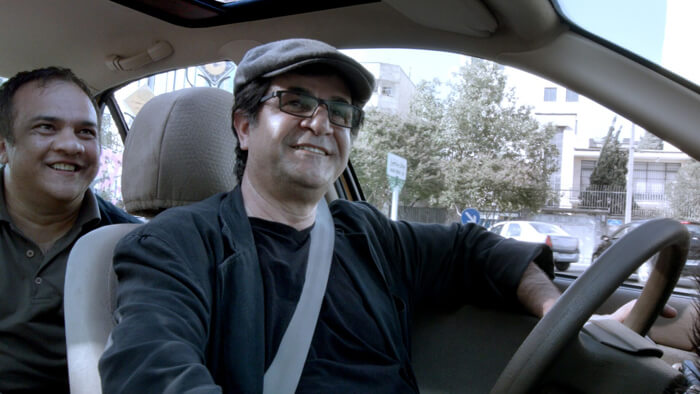This Is Not a Road Movie: Banned Iranian Filmmaker Jafar Panahi’s Taxi
Taxi
Directed by Jafar Panahi
Opens October 2
For a director sentenced by the Iranian government in 2010 to a twenty year ban on filmmaking activities, Jafar Panahi has been astoundingly prolific: Taxi marks his third samizdat movie in five years. It is also an excellent, multi-layered work of art, by turns technically inventive, politically cogent, and alternatingly caustic and comic—the kind of achievement that inspires not only through the mere fact of its existence but also through the depth of its vision and strength of its humility.
In Taxi, Panahi plays himself driving the titular vehicle through Tehran and collecting passengers en route to picking up his precocious niece (Hana Saeidi) from school. Along the way he encounters an accident victim, a contraband DVD salesman, an old friend recently injured in a beating, and a woman on her way to delivering flowers to a political prisoner. Shot on cellphones and dash cams, the film never feels gimmicky: if anything, Panahi expands his one-time collaborator Abbas Kiarostami’s patented auto-bound image-making—and bursts out of his imposed confines as documented in 2011’s This Is Not a Film—by mobilizing cameras as well as placing them in the hands of multiple characters.
Shifts in camera position and POV accord with the conflicting opinions that circle around Taxi’s primary subject: Panahi’s status as a condemned filmmaker. Whether implied or directly stated (several characters “recognize” Panahi and wonder why he’s become a cab driver), Panahi’s sentence is considered through arguments concerning the punishment of criminals, the economics of pirating, and the characteristics that comprise state-approved “distributable” movies. The niece relates the staunch dictates that have been taught to her in school concerning cinematic propriety, and yet when a young boy refuses to return stolen money so that she can shoot a happy ending to an accidentally recorded theft, she learns a valuable lesson: the Iranian authorities’ prohibitions against “sordid realism” cannot suppress sordid reality, which in the digital/surveillance age will readily find a camera for which to unfold. That may seem obvious, but Panahi makes this point—as well as many others—by way of playfully choreographed narrative events and convincing non-professional performances that prove the indomitability of his imagination as well as his resistance.
You might also like 




















